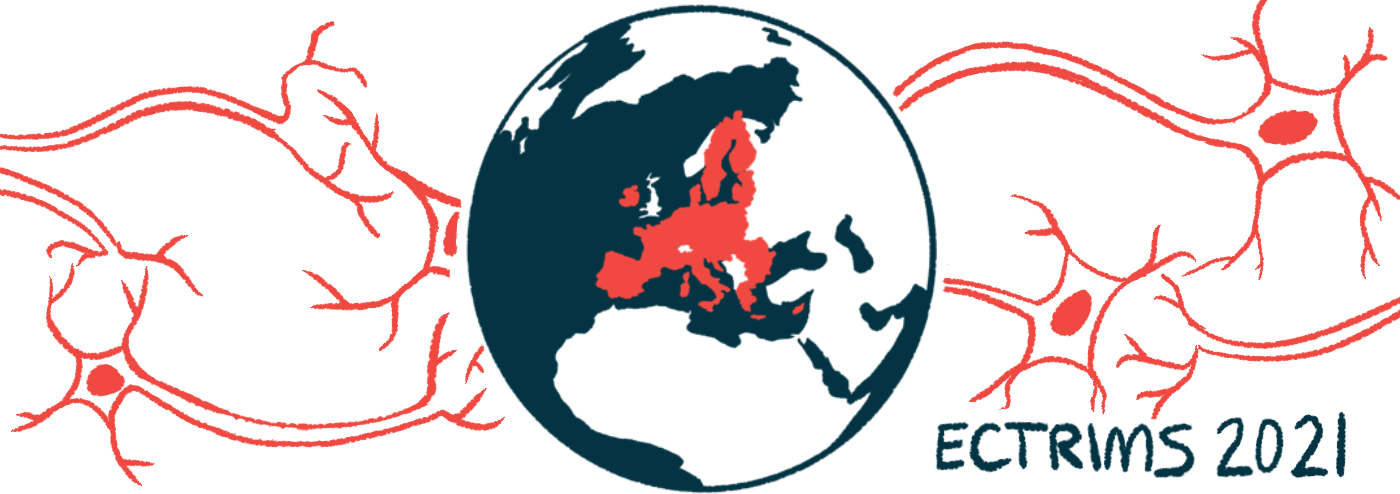#ECTRIMS2021 – Ponvory Effective in Early MS in OPTIMUM Trial

Editor’s note: The Multiple Sclerosis News Today team is providing in-depth coverage of the virtual 37th Congress of the European Committee for Treatment and Research in Multiple Sclerosis (ECTRIMS), Oct. 13–15. Go here to see the latest stories from the conference.
Treatment with Ponvory (ponesimod) markedly reduces relapse rates, fatigue, and evidence of brain damage compared with Aubagio (teriflunomide), with its beneficial effects particularly pronounced in individuals with relatively early multiple sclerosis (MS), according to a new analysis of data from the OPTIMUM clinical trial.
Data from OPTIMUM also show that Ponvory significantly decreased the use of corticosteroids to manage MS relapses.
Researchers at Janssen, which markets Ponvory, shared these results in a pair of posters at the 37th Congress of the European Committee for Treatment and Research in Multiple Sclerosis (ECTRIMS), being held virtually Oct. 13-15.
“We’re pleased to present data from our ongoing clinical program in multiple sclerosis at the ECTRIMS congress, which further support the clinical benefits of Ponvory,” Bill Martin, PhD, global therapeutic area head of neuroscience at Janssen Research and Development, said in a press release.
The Phase 3 OPTIMUM clinical trial (NCT02425644) enrolled 1,133 participants with relapsing-remitting MS (97.5%) or secondary progressive MS (2.5%) at 162 centers worldwide. Participants were treated with either Ponvory or Aubagio, both oral medications, taken daily for 108 weeks (about two years).
Full results from the trial were published earlier this year, and showed that Ponvory outperformed Aubagio in reducing relapse rates, fatigue, and evidence of brain damage. Based on the results, Ponvory was approved in the U.S. and the European Union as a treatment for relapsing forms of MS.
“The approval of Ponvory marks an important step in reinforcing our company commitment to the broader neurology field, and provides patients with a safe and efficacious new option to treat MS,” Martin said.
In general, starting treatment earlier on in the course of MS leads to better clinical outcomes. Now, researchers at Janssen conducted an analysis of data from OPTIMUM to examine the effects of Ponvory in individuals with a relatively early disease course.
The results were shared by Maria Ait-Tihyaty, PhD, director of global medical affairs at Janssen, in a poster titled “Ponesimod demonstrated increased clinical benefit over teriflunomide in early disease subgroup compared with overall population.”
For the purposes of the analysis, the researchers defined “early disease” as patients with an Expanded Disability Status Score (EDSS) of 3.0 or lower — indicating mild to moderate disability but no walking problems — or who had never been treated with an MS medication prior to starting on Ponvory.
In the low-EDSS group, the results showed that treatment with Ponvory reduced the annualized relapse rate by 47% and lowered fatigue scores by 4.31 points, compared with Aubagio.
For comparison, in the overall population, the annual relapse rate was 30.5% lower with Ponvory than Aubagio, and the difference in fatigue scores was on average 3.57 points.
Similar results were found in the previously untreated group, particularly regarding fatigue. The fatigue scores were even more pronouncedly reduced in the subgroup of patients who were both previously untreated and had low EDSS scores.
“Ponesimod [Ponvory] demonstrated increased clinical benefit as compared with teriflunomide [Aubagio] in early disease subgroups and compared with the overall population. This subgroup analysis confirms the advantage of using ponesimod as an early high efficacy treatment,” the researchers concluded.
In another analysis, investigators assessed the use of corticosteroids — immune-suppressing medicines that are commonly used to control MS relapses — during the OPTIMUM trial. A poster, also presented by Ait-Tihyaty and titled “Effect of ponesimod compared with teriflunomide on treatment with concomitant corticosteroids for relapse in patients with relapsing forms of multiple sclerosis,” highlighted that analysis’ findings.
Data showed that the proportion of patients who required at least one corticosteroid treatment for MS relapse was significantly lower among patients on Ponvory, compared with Aubagio (29.1% vs. 40.1%). The overall amount of corticosteroids used from the start to the end of the study was significantly lower in the Ponvory group than among those given Aubagio (3207.1 mg vs. 4257.2 mg).
Sex and prior MS treatment did not influence the results, but the team found that the differences were particularly evident in patients with earlier disease — defined as an EDSS score of 3.5 or lower at the study’s start. In patients with more severe disability, there was a trend toward greater corticosteroid use in the Ponvory group.
“In the OPTIMUM trial, patients with [relapsing MS] treated with [ponesimod] achieved a lower rate of concomitant [systemic corticosteroid] usage for the management of relapses compared with patients treated with [teriflunomide],” the researchers concluded, adding that the findings were more pronounced in patients with less disability at the study’s start.







